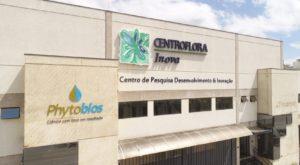(MENAFN- Brazil-Arab News Agency (ANBA))
São Paulo – , the biggest phytopharmaceutical extract and input manufacturing conglomerate in Brazil, is looking to broaden and diversify its foreign sales with the opening of a new plant in Botucatu, São Paulo next July.
On the market for 62 years now, the company sold off its cosmetics and nutraceuticals operations five years ago to the Swiss group Givaudan. Now, its sole line of business is pharmaceuticals taken from Brazilian nature. 'Those are two very different businesses in terms of manufacturing practices. They require dedicated manufacturing facilities, so we made this strategic decision of focusing exclusively in pharmaceuticals, which is very much our DNA,' Centroflora Innovation director Cristina Ropke told ANBA.
The company has plants in the states of Piauí and São Paulo, as well as farmland across Brazil. It grows jaborandi in Pará, Maranhão and Piauí and passionflower in the Southeast, for instance.
Centroflora exports pilocarpine, a molecule isolated from jaborandi, which it processes in Piauí. The product is used in glaucoma and dry mouth treatments, among other uses which are about to get approval from the United States' Food and Drug Administration (FDA), according to Ropke.
The company has over 25,000 working as jaborandi pickers. Roughly 200 tons get processed at a plant in Parnaíba, Piauí, which Ropke said has been audited by the FDA and the European Directorate for the Quality of Medicines (EDQM). The processing plant upholds the loftiest best practice standards, she said.
'It's a very interesting, very perennial business. There's this whole training so people will take good care of the jaborandi. It works out great. There is a cutting technique where the leaf doesn't get torn out. The pickers undergo training so they protect the forest where the jaborandi grows,' said Ropke.

Centroflora’s Research, Development and Innovation Center in Campinas, São Paulo
Centroflora exports virtually all its pilocarpine to Europe, which resells to the world over, including Arab countries.
Ropke explained that the company's sustainability is not in evidence because it sells B2B. Thus, what counts the most are its registrationsa and certificates with regulatory bodies.
'This ESG side of ours isn't always made public. We try to showcase and discuss it as a plus, because our sales are made on the basis of therapeutical indications. The pilocarpine, for instance, is registered as a synthetic product,' she said. ESG is the acronym for Environmental, Social and Corporate Governance.
Centroflora's flagship products on the domestic market are its extracts for phytopharmaceuticals designed to treat anxiety, such as passionflower and valerian. 'Our manufacturing operations serve Brazil, and then we are about to open this new plant in Botucatu in July. The new plant will cater to Brazil and the foreign market, because the whole world is coordinating its laws, so the idea is to increase and diversify exports into destinations other than the usual ones, which are Europe and the United States. The sky is the limit,' said Ropke.
Centroflora also makes components used in making hepatic protectors, laxatives, etc.
The conglomerate also has a Research, Development and Innovation Center in Campinas, where it invests in research alongside Fundação Oswaldo Cruz (Fiocruz) and Brazilian educational institutions including the Federal University of Ceará e and the Federal University of Piauí.
Translated by Gabriel Pomerancblum
Press ReleasePress Release
The post appeared first on .
MENAFN27042021000213011057ID1101993682
Legal Disclaimer:
MENAFN provides the information “as is” without warranty of any kind. We do not accept any responsibility or liability for the accuracy, content, images, videos, licenses, completeness, legality, or reliability of the information contained in this article. If you have any complaints or copyright issues related to this article, kindly contact the provider above.